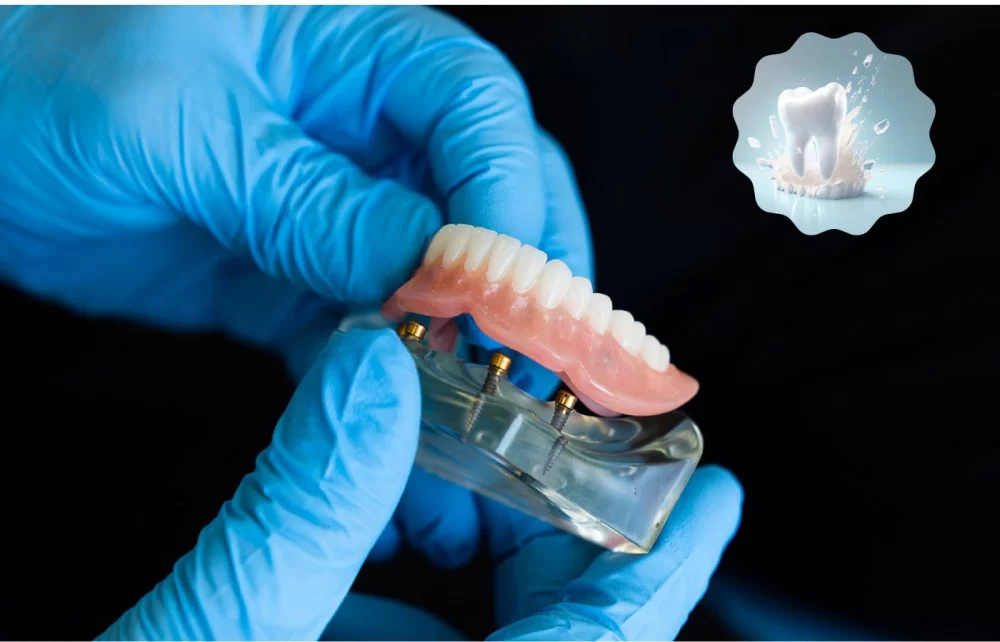
- Understanding-the-Importance-of-Denture-Care
- Daily-Cleaning-Routines-for-Dentures
- Best-Practices-to-Prevent-Denture-Infection
- Common-Mistakes-and-How-to-Avoid-Them
- Real-Life-Examples-Highlight-Denture-Care-Importance
- Where-to-Find-Reliable-Denture-Care-Products
1. Understanding the Importance of Denture Care
Wearing dentures is a life-changing solution for many people who have lost their natural teeth, restoring both appearance and functionality. However, without proper care, dentures can become a breeding ground for bacteria and fungi, leading to infections such as denture stomatitis, bad breath, and discomfort. Knowing how to care for dentures to avoid infection is essential not only for oral health but also for overall well-being.
Denture care extends beyond simply rinsing them under water. It involves a detailed hygiene routine and understanding the materials dentures are made from, which can harbor microbes if neglected. A well-maintained denture not only lasts longer but also protects your gums and mouth from inflammation or more severe infections.
Why Infection Risk is High Without Proper Care
The moist environment inside the mouth combined with food particles and plaque buildup on dentures creates ideal conditions for microbial growth. Candida albicans, a common fungus, often colonizes denture surfaces leading to painful infections. These infections can cause redness, swelling, and soreness, affecting your ability to eat and speak comfortably. Hence, mastering denture care is vital.
2. Daily Cleaning Routines for Dentures
Effective denture hygiene is the cornerstone of preventing infection. Cleaning dentures daily removes food debris, plaque, and microbes. Here’s a comprehensive routine:
Step 1: Rinse Immediately After Eating
After each meal, gently remove dentures and rinse them under running water. This helps dislodge loose food particles that can feed bacteria.
Step 2: Use a Soft-Bristled Brush and Denture Cleaner
Unlike natural teeth, dentures should never be brushed with regular toothpaste as it can be abrasive. Instead, use a soft brush designed specifically for dentures along with a gentle cleanser. Scrub all surfaces carefully, paying attention to crevices and the part that rests against your gums.
Step 3: Soak Overnight
Most dentures need to stay moist to retain their shape. Use a commercial denture-soaking solution overnight to keep them clean and disinfected. This step also helps dissolve stubborn deposits that brushing may miss.
3. Best Practices to Prevent Denture Infection
Beyond daily cleaning, adopting specific habits can dramatically reduce infection risk:
Maintain Oral Hygiene Even Without Natural Teeth
It’s easy to neglect gums and tongue when dentures replace natural teeth, but these areas also need regular cleaning. Use a soft brush or a damp cloth to gently massage gums, tongue, and palate daily to remove bacteria and stimulate circulation.
Remove Dentures Regularly
Give your mouth a break by removing dentures for at least six hours daily, preferably during sleep. This resting period helps gums recover and reduces continuous microbial buildup.
Visit Your Dentist Regularly
Professional check-ups ensure your dentures fit correctly and allow early detection of any signs of infection or irritation. Dentists can professionally clean your dentures, preventing complications.
Use Recommended Products
Avoid homemade cleaning methods like bleach or vinegar, which can damage dentures and irritate tissues. Instead, use trusted denture cleaners recommended by dental professionals.
4. Common Mistakes and How to Avoid Them
Many denture wearers unintentionally increase their infection risk by committing avoidable errors:
Neglecting Regular Cleaning
Some users rinse dentures but skip thorough brushing, allowing biofilm buildup. Always combine rinsing with brushing for effective hygiene.
Sleeping with Dentures On
Wearing dentures overnight traps moisture and bacteria against gums, which promotes infections. Remove them before sleeping to keep your mouth healthy.
Improper Storage
Storing dentures dry causes warping and cracks, while storing in plain water without disinfectants may not eliminate germs. Use appropriate soaking solutions and containers.
5. Real-Life Examples Highlight Denture Care Importance
Consider Mrs. Thompson, a 68-year-old who neglected proper denture care after tooth loss. She began experiencing persistent soreness and redness under her dentures. Upon visiting her dentist, she was diagnosed with denture stomatitis caused by fungal infection. With improved cleaning routines, removal at night, and antifungal treatment, her condition improved significantly. This case underscores the importance of how to care for dentures to avoid infection.
Another story comes from Mr. Lee, who used harsh bleach solutions to clean his dentures, damaging their surface and causing irritation in his mouth. Switching to dentist-recommended cleansers helped restore comfort and hygiene. Such stories remind us that the right products and routines matter immensely.
6. Where to Find Reliable Denture Care Products
For those seeking quality denture care supplies, Dentistry Toothtruth offers a curated selection of trusted products including soft brushes, effective cleaners, and soaking solutions tailored to different denture types. Their expert advice and product range can help you maintain your dentures properly and prevent infection.
Incorporating these detailed care practices into your daily routine ensures a healthy mouth and long-lasting dentures. Remember, good denture hygiene is not just about appearance—it’s a vital part of your overall health.







 CORE Dental4.0 (123 review)
CORE Dental4.0 (123 review) Brilliant Smiles Dentistry4.0 (331 review)
Brilliant Smiles Dentistry4.0 (331 review) Hurley and Volk Orthodontics - South Elgin4.0 (410 review)
Hurley and Volk Orthodontics - South Elgin4.0 (410 review) Dentist Implants Bucks County5.0 (7 review)
Dentist Implants Bucks County5.0 (7 review) All Family Dental and Braces4.0 (689 review)
All Family Dental and Braces4.0 (689 review) Polaris Dental Care4.0 (170 review)
Polaris Dental Care4.0 (170 review) The Importance of Oral Health Education During Pregnancy for a Healthy Pregnancy
The Importance of Oral Health Education During Pregnancy for a Healthy Pregnancy Best Tips for Brushing Your Teeth Properly for Healthy Gums: Essential Techniques for Oral Health
Best Tips for Brushing Your Teeth Properly for Healthy Gums: Essential Techniques for Oral Health Why Skipping Dental Checkups Can Lead to Bigger Oral Health Problems
Why Skipping Dental Checkups Can Lead to Bigger Oral Health Problems Advantages of Porcelain Dental Restorations
Advantages of Porcelain Dental Restorations How Can Diabetes Cause Tooth and Gum Problems? Preventing and Managing Oral Health Issues
How Can Diabetes Cause Tooth and Gum Problems? Preventing and Managing Oral Health Issues Healthy Habits for Promoting Good Oral Health and Hygiene: Tips for a Healthy Smile
Healthy Habits for Promoting Good Oral Health and Hygiene: Tips for a Healthy Smile